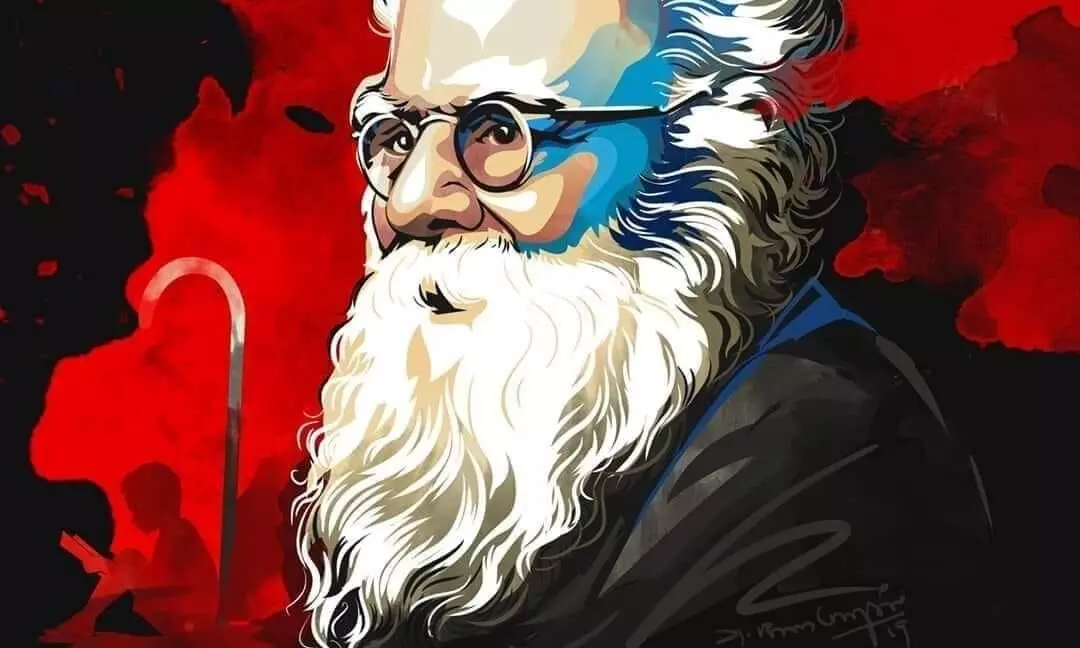

Image Courtesy : Facebook/https://www.facebook.com/Periyar-EVRamasamy-542846699219044
Periyar@143-Revolutionary and Visionary
text_fieldsHumanity has progressed both in civilization and other forms of development. The pace of progress since the 19th century in science and technology side has been enormous which brought a sea change both in life style and standard of living of people throughout the world.
Despite these developments, the social discrimination and inequalities have been prevailing unabated in human societies. M-many service providers and reformists have contributed towards setting right these setbacks. , But in certain parts of the world, the severity of social inequities are deep-rooted, especially in the Indian sub-continent. The social injustice in the country is unique since it originated from the birth of the individual which could not be set right easily. Besides, the social disparity and the resultant discrimination which has got the backing of religious dogmas defied easy eradication.
Many religious stalwarts came to correct the social discrimination under the garb of reformists and did only tinkering work here and there. The religious sages did not even touch the deep-rooted cause. What they did was only application of ointments to the wounds by looking at it superficially, without diagnosing the germs that caused the social disease. Apparent success prevailed during the life period of those 'reformers'. But after their demise, the social conditions became worse than what prevailed when they commenced the so-called reformative deeds.
At the beginning of 20th century the prospective social revolutionary Periyar E.V. Ramasamy (1879-1973) came to public life. Hailing from a highly orthodox Vaishnavite familly, Periyar grew with detachment from the religious surrounding but keenly watched them. Close observation on the social surroundings created a lot of contradictions in his mind which soon emerged as social confrontation later. He entered public life and assumed lot many responsibilities through nomination and in honorary terms. His thirstfor the socialcause did not subside by doing small services in a limited area.
At that time the Congress Party was the only national political organization. The image of Gandhi attracted many people to join the party.But in Tamil Nadu (the then Madras Presidency), the Congress party wanted to utilize the services of Periyar. From 1919 to 1925, Periyar remained in the Congress.With much hope on communal representation, Periyar joined the Congress,which was promised to him too. But the Congress Party went back on its word to introduce communal representation as one of the resolutions for passage.
After leaving the Congress Party, he founded the Self-Respect Movement and extended the support to the then ruling party viz.Justice party,the main political party serving the cause of non-Brahmins. Periyar did not join Justice Party despite the warm invitation extended by its leaders,but remained supportive to it for all the progressive initiatives,for translating his ideology into practice.
In 1937,when the Justice Party was defeated miserably in the elections,its loyal leaders requested Periyar to assume the leadership of Justice Party.Many leaders who tasted the power of rule in Justice Party left it and Periyar became its President. He revamped the Justice Party as a people-oriented movement. Periyar merged his Self-Respect Movement and Justice Party and named it as Dravidar Kazhagam (DK) in 1944.
Periyar founded the DK to the stature of his expectation to suit the propaganda of his ideology by keeping at distance the participation (contesting) in the electoral process.
Even though he had left Congress in 1925, from 1947, Periyar supported the Congress rule by the Chief Ministers, Omandur Ramasamy Reddiar and K. Kamaraj. His support to them was mainly based on the ruling party's willingness to implement the measures propagated by Periyar and his movement.
From 1967 onwards the Dravidian political party viz Dravida Munnetta Kazhakam (DMK) came to power in Tamil Nadu. From then onwards, the state of Tamil Nadu has seen only the rule of Dravidian political parties, alternating between DMK and AIDMK (All-India Anna DMK), the current ruling party.
Periyar brought the pride of Dravidian identity to the vast, oppressed population – an identity that had prevailed only in scholarly works which now came to the picture as a legacy of pride. It has infiltrated into almost all the political parties in Tamil Nadu.
The political legacy which Periyar left behind is upheld now by all, despite the fact that Periyar's movement was apolitical. He did not aspire for any power or position but concentrated only in changing the mind-set of the people to lead a dignified life on par with the historically privileged sections. For all these social tasks, Periyar did not choose any path of weapon or by adopting violent means. His strategy on the other hand consisted in sustained propaganda of ideology, creating public opinion for progressive measures, compelling the rulers to bring legislation reflecting public opinion,executing and making them permanent.
Whatever remains as hurdles for change has to be removed, however old, traditional and divine they might be. Both the vision and mission of Periyar are unique. His silent revolution devoid of violence has occurred in the Indian sub-continent. To the extent the ideology of Periyar is rich and robust, the mode of implementation was also effective. That is why Periyar continues to be relevant ideologically and organizationally even 47 years after his demise. Viewed that way, Periyar was a revolutionary visionary par excellence.
(This article was first published in September 2020 issue of "The Modern Rationalist monthly" which was founded by Thanthai Periyar )






















